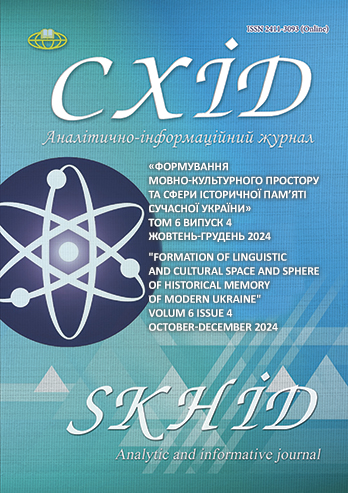Language and Language Policy as Instruments for Shaping National Identity
DOI:
https://doi.org/10.21847/2411-3093.2024.642Keywords:
language, national identity, language policy, personal identity, elite, societal consolidationAbstract
This article presents a philosophical analysis of the interconnection between language, national and personal identity, and the role of the modern Ukrainian elite in the context of Ukraine’s language policy. It examines the philosophical aspects of forming national identity through language, the impact of social changes on identity, and the contradictions in the views of various authors on these issues. A novel methodological approach is applied, based on the theoretical and methodological concept of J. Derrida, which demonstrates a transition from the language of identities to the language of differences in both ontological and epistemological dimensions of research. The prioritization of the procedure of differentiation over the search for identity leads to an innovative interpretation of the concept of unity through the combination and coexistence of social diversity. The cultural unity of the nation emerges as a construct founded on the significant presence of diverse subjects that create a shared cultural and political world. Drawing on the works of B. Azhnyuk, V. Kulyk, O. Lytvynchuk, and M. Piren, it analyzes contemporary approaches to understanding language policy, its European foundations, and its influence on Ukraine’s state-building processes. The role of the elite in consolidating society and implementing democratic reforms is highlighted, with specific examples and proposals for improving language policy. The article also identifies prospects for further research in this area.
Downloads
References
Azhnyuk, B. (2017). Language Policy: National Identity and European Values. Bulletin of the National Academy of Sciences of Ukraine, No. 9, 23–33.
Central Statistics Office Ireland. (2016). Census of Population 2016 – Profile 10 Education, Skills and the Irish Language. Central Statistics Office Ireland. Re-trieved from https://www.cso.ie/en/releasesandpublications/¬ep/p-cp10esil/p10esil/.
Cheskin, A., & Polese, A. (2016). Nation-Building in Post-Soviet Estonia and Latvia: Policy, Discourse, and Identity. Journal of Baltic Studies, Vol. 47. No. 1, 113–129.
Cheskin, A., & Kachuyevski, A. (2019). The Russian-Speaking Populations in the Post-Soviet Space: Language, Politics, and Identity. Europe-Asia Studies, Vol. 71. No. 1, 1–23.
Derrida, J. (2000). Of Grammatology. (Translated from French). Kyiv, Osnovy.
Government of Canada. (2019). Official Languages Act. Government of Canada. https://laws-lois.justice.gc.ca/eng/acts/O-3.01/page-1.html.
Kolinko, M. V. (2019). Intercultural Communication: A Topological Dimension. Vinnytsia: TOV «TVORY».
Kulyk, V. (2015). Language and Identity in Ukraine after the Euromaidan. Scientific Notes of NaUKMA, 176, 3–12.
Kyiv International Institute of Sociology. (2024). Dynamics of Attitudes Towards the Status of the Russian Language in Ukraine. Kyiv International Institute of Sociology. https://www.kiis.com.ua/?lang=ukr&cat=reports&id=1385&page=1.
Lytvynchuk, O. (2014). Social and Personal Identity: A Socio-Philosophical Analysis. Philosophical Studies, 2, 41–47.
Ukrainian Language During the War: Key Development Trends. (2023). National Institute for Strategic Stud-ies. https://niss.gov.ua/news/komentari-ekspertiv/ukrayinska-mova-pid-chas-viyny-klyuchovi-tendentsiyi-rozvytku.
Piren, M. (2012). National Identity of the Modern Ukrainian Elite as a Factor in Society's Consolidation and the Implementation of Democratic Reforms. State Administration: Theory and Practice, 2, 12–20.
Ricoeur, P. (2002). Oneself as Another. (Transl. from French). Kyiv: Dukh i Litera.
Spolsky, B. (2014). The Languages of the Jews: A Sociolinguistic History. Cambridge: Cambridge University Press. https://doi.org/10.1017/CBO9781107295292 .
Taylor, C. (2005). Sources of the Self: The Making of Modern Identity (Transl. from English by A. Mokrousova). Lviv: Lytopys.
Downloads
Published
How to Cite
Issue
Section
License
Copyright (c) 2025 Павло Федорченко

This work is licensed under a Creative Commons Attribution-NonCommercial-NoDerivatives 4.0 International License.
1. Authors bear responsibility for the accuracy of facts, quotations, numbers and names used.
2. Manuscripts are not sent back.
3. The publisher does not always agree with the authors' opinion.
4. The authors reserve the right to authorship of the work and pass the first publication right of this work to the journal under the terms of a Creative Commons Attribution-NonCommercial-NoDerivatives 4.0 International License. This license allows others to distribute (copy) the published work for non-commercial purposes, provided there is mandatory attribution to its authors and a link to the first publication in our journal.
5. The authors have the right to conclude separate supplement agreements that relate to non-exclusive work distribution in the form in which it has been published by the journal (for example, to upload the work to the online storage of the journal or publish it as part of a monograph), provided that the reference to the first publication of the work in this journal is included.

